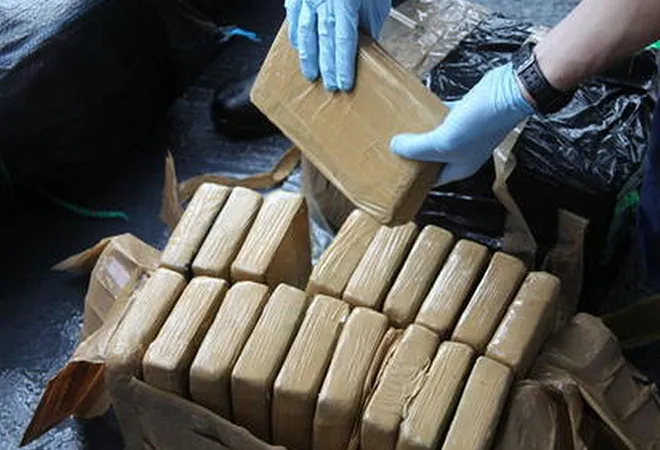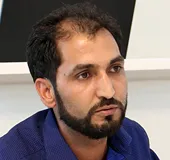
On 27 June 2020, drugs worth INR 64 crores were ceased along with a cache of arms including two pistols and four grenades from two narco-terror smugglers by a joint team of security forces in Kashmir’s Kupwara district. Decades of violent insurgency and conflict has led to a worrying rise in substance abuse and drug addiction among the youth across the social strata. According to reports, in Srinagar and Anantnag districts of Kashmir, drugs worth INR 3.7 crores are sold every day. The number of drug addicts in the twin districts has increased to 17,000 according to a recent study conducted by Institute of Mental Health and Neurosciences (IMHANS). As per the available data, the number of drug addicts in Kashmir was 70,000 in December 2018. This included 4,000 women and even a few children. According to a survey conducted by Ministry of Social Justice and Empowerment (MoSJE) in February 2019, 600,000 people, i.e. 4.6 percent of the total population of the erstwhile state of Jammu and Kashmir use opioid drugs, while 80 percent of the drug addicts in Kashmir use heroin and morphine.
Once a tranquil land of Pirs and Pandits, who represented Kashmir’s unique composite culture, the Valley’s social ethos and traditional social norms have been shattered. Conflict and the resultant trauma has also led to the erosion of the land’s social structures and fractured the traditional social control system at the community level.
The armed insurgency in Kashmir that started in 1989 killed thousands of people, security forces, militants, leaving behind a trail of widows and orphaned children. The unending conflict, instilled terror from across the border, heavy militarisation of the Valley as the state response to it, social polarisation, the violence that spilt on the streets on almost the daily basis, has faded the century-old value systems, tattered the cultural fabric and blemished the syncretic culture of the land. The resulting chaos has dealt a death blow to fundamental social institutions, created social disruptions, made economic institutions fragile and ruptured the modern parochial political setup in Kashmir. While Kashmiriyat, the region’s unique composite culture that glued the Pandits and Muslims together in peaceful coexistence ended with the mass exodus of the Pandits, the Muslim majority that remained in the Valley had to bear with the heavy loss of social capital. While regular functioning of schools and colleges was affected, the informal traditional social system, that formed the backbone of the ‘Kashmiri’ way of life suffered irreparable damage.
The conflict has left a deep social and psychological impact among the population. Memories of destruction, killings of loved ones, and living under the constant shadow of the gun has given rise to widespread depression and anxiety among the people of the Valley. Repeated strike calls given by separatists and militants, long-term curfews imposed by the state leading to frequent and indefinite loss of school and college education has increased anxiety and depression, luring the impressionable young minds of Kashmir to the perils of drug addiction.
While conflict and its collateral damage constitutes the major reason for increasing anxiety and psychological disorders, Pakistan has over the years abused the situation to establish smuggling networks within the Valley, and ensured a steady supply of narcotics. On 29 June 2019, Customs officials in Amritsar near the Attari border ceased heroin worth INR 2,700 crores intended to be smuggled into Kashmir. The suspension of the usual smuggling route that passed through the border near Uri sector in the wake of the Pulwama attack and the retaliatory action by India had forced Pakistan to push in drugs through Attari. Pakistan has also made full use of the weak enforcement of the Narcotic Drugs and Psychotropic Substances Act of 1985 by India, as the peddlers, though booked under non-bailable offences, are often let off quickly within five to ten days.
The conflict has also given a death blow to the formal social control system enforced by the modern state apparatus. Torn by conflict since 1989, the modern state apparatus, overburdened with anti-militancy operations and other security and administrative duties, has failed to take charge of the deviant behaviour of individuals. The complete breakdown of informal traditional methods of social control, which were based on belief systems and were implemented by village elders and revered community members has, on the other hand, given a free-run to radical forces.
The social and political vacuum created over the last 30 years was replaced by contesting Islamic religious ideologies such as Jamat-i-Islami, Salafism and Tableeg. The advent of digital media has only contributed to making these ideologies stronger and led to the proliferation of radicalism. Contesting ideologies and a constant bombardment of unchecked news, opinions, extremist posts on social media have silenced the sane voices of the village elders and community leaders. As a result, public sentiment, especially that of the youth, has become increasingly critical of the traditional social mores and identities, further weakening the informal traditional social control systems fueling deviant behavior at the societal level. Influenced by radical forces, the youth of Kashmir has become pawns of extremism and taken to substance abuse in large numbers.
The local administration had promised to crackdown on drug mafia post the abrogation of Article 370 in August 2019, but the reality gives contrasting signals. Many politicians and separatists are involved in drug smuggling and their benefaction has ensured that the drug lords continue to operate with ease and assurance. In fact, the draconian communications lockdown enforced by the state that saw the blocking of the internet, shutting off of mobile networks, and indefinite closure of educational institutions drove more youth to such behaviour. The months of boredom, psychological stress, lack of recreational activities in the months following the abrogation of Article 370 created an environment for drug addiction to proliferate even among the educated youth in well-off families.
In total disregard of the local sentiments, on 20 June 2020, the Excise Commissioner issued a notification to set up “187 liquor shops in the Union Territory of J&K, including 67 in Kashmir”. The notification was met with criticism from all religious leaders and civil society groups. The grand mufti Nasir-ul-Islam termed the notification to be “a fresh assault on Kashmir’s culture and a move to drag Valley’s youth towards immorality.” A day after strong public outcry, administration backtracked stating that no new liquor licenses will be issued and urged Kashmiris not to trust “rumours or half-baked news”.
All the stakeholders of Kashmiri society whether administration, civil society members, general population, parents, formal as well as informal social control systems need to sincerely contemplate on what long-term conflict and contesting religious ideologies have meant for the syncretic culture of the Kashmir Valley. All the stakeholders should not see things through history, but analyse the situation in terms of a better future. With militancy and separatism currently on the backfoot, it is an ideal time for the governments the state and central levels to ensure that both the formal social control system represented by the administrative machinery and Kashmir’s traditional informal social control system represented by village elders and community leaders galvanise to save the valley from drug menace, extremism and unending conflict. Such a move could prove to be the long-awaited Confidence Building Measure (CBM) promised after the abrogation of Article 370 to chalk out a plan for the better future of Kashmir.
As drug trade, armed insurgency and long-term conflict go hand in hand, all the stakeholders will have to come together to give peace a chance to prevail.
The views expressed above belong to the author(s). ORF research and analyses now available on Telegram! Click here to access our curated content — blogs, longforms and interviews.




 PREV
PREV


